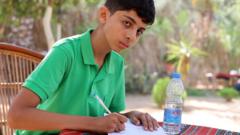As Gaza continues to endure the ravages of war, the lives of its youngest inhabitants reveal both profound suffering and remarkable resilience. The documentary "Gaza: How to Survive a Warzone," directed by Jamie Roberts and Yousef Hammash, chronicles the stories of children living in this conflict-ridden environment and the unique ways they navigate their daily realities.
Zakaria, an 11-year-old boy, stands out as one of the documentary's subjects. A volunteer at al-Aqsa hospital in Deir al-Balah, Zakaria assists paramedics in transporting casualties, having witnessed heartbreaking scenes and countless victims since the war began. Instead of attending school, he has become an integral, albeit unofficial, part of the medical team, working amidst the constant influx of patients in need of urgent care. "I must have seen at least 5,000 bodies," he recounts somberly, emphasizing the grim reality he faces every day.
The filmmakers aimed to convey the essence of everyday life for Gazan residents, particularly children, amidst the chaos of war. Despite challenges in obtaining footage, they worked diligently with local cameramen in Gaza to capture the struggles and resilience of its people. The documentary's focus on innocent young lives, such as Zakaria's, is a poignant reminder of the human cost of conflict.
Another child featured is Abdullah, 13, who once attended a British school. Despite the devastation around him, he strives to continue his education through makeshift means, showcasing his determination to rise above adversity. The film also follows Renad, a 10-year-old girl who has created a popular cooking show on TikTok with the help of her sister, despite scarce ingredients in the war-torn area. Her efforts have attracted over a million followers and serve as a source of hope and creativity amid despair.
Rana, a 24-year-old mother who prematurely gave birth to her baby girl during the conflict, provides a glimpse into the struggles faced by families in Gaza. Displaced multiple times, she now resides near the hospital with her children. Her story highlights the extended reach of the war's impact on future generations.
While the filmmakers observe the everyday operations of al-Aqsa hospital, they highlight the efforts of medical staff as they face enormous challenges in providing care. Zakaria, often staying overnight at the hospital to avoid his family's scarcity of food and water, often finds solace and inspiration among the paramedics he admires.
In moments of respite, hospital personnel encourage Zakaria to enjoy fleeting experiences of childhood, such as trips to the beach. Despite the fleeting moments of joy, there is a lingering concern that exposure to trauma may irreparably alter his childhood experience.
In expressing his aspirations, Zakaria states, "I want to be a paramedic. But first I need to get out of here." His story emphasizes both the longing for a brighter future and the heavy burden of the current situation.
The documentary, airing on BBC Two and iPlayer, captures the voices and experiences of Gaza's children, underscoring the urgent need for international attention to their plight. Through the lens of their resilience and the indomitable spirit of youth, a narrative emerges: one that advocates hope amidst conflict.



















